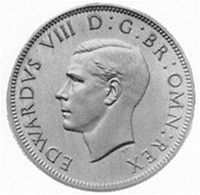Coronation oath
The English Coronation Oath ( Coronation Oath ) is an oath of the British monarch and goes at least up to the coronation Edgar in Bath Abbey in 973 back.
In the UK, the monarch is not required to take a formal oath to ascend the throne. However, he or she must take an oath regarding the safety of the Church of Scotland . At a coronation , the monarch usually takes an oath, but since a coronation is immaterial, the monarchs do not have to take such an oath in order to perform their duties, as in the case of Edward VIII .

history
Beginnings
At the time of Edgar the oath is said to have read as follows:
|
First, that the church of God and the whole Christian people shall have true peace at all time by our judgment; Second, that I will forbid extortion and all kinds of wrong-doing to all orders of men; Third, that I will enjoin equity and mercy in all judgments, so that God, who is kind and merciful, may vouchsafe his mercy to me and to you. |
First, that the Church of God and all Christian people under my government should enjoy true peace. Second, that I want to forbid every kind of robbery and injustice to everyone regardless of class. Thirdly, that in all judgments I will combine impartiality with mercy, so that the all-good and gracious God may forgive me and you through his grace. |
Under the Coronation Oath Act 1688
Changes were made to it over time, particularly in the 17th century . In 1689 a law was passed ( Coronation Oath Act 1688 ) declaring the oath as follows:
|
The Archbishop or bishop shall say, "Will you solemnly promise and swear to govern the people of this Kingdom of England, and the dominions belonging, according to the statutes in Parliament agreed on, and the laws and customs of the same?" |
The Archbishop or Bishop says : "Will you vow and swear to rule the people of this Kingdom of England and the gentlemen belonging to it according to the statutes established in Parliament and according to the laws and customs of the same? |
Then the king should put his hand and the queen their hand on the holy gospels and say: "The things which I have here before promised, I will perform and keep: So help me God." ( The things that I have promised here before, I will carry out and keep: So help me God! )
After the 17th century, the oath remained largely unchanged for a long time. In 1937 the words "according to the statutes in Parliament agreed on" were removed from the Cabinet (government).
Coronation oath of Elizabeth II
The oath that Queen Elizabeth II took at her coronation on June 2, 1953 , was taken here:
|
Archbishop . Will you solemnly promise and swear to govern the Peoples of the United Kingdom of Great Britain and Northern Ireland, Canada, Australia, New Zealand, the Union of South Africa, Pakistan, and Ceylon, and of your Possessions and the other Territories to any of them belonging or pertaining, according to their respective laws and customs? |
Archbishop . Will you pledge and swear to rule over the peoples of the United Kingdom of Great Britain and Northern Ireland , Canada , Australia , New Zealand , the Union of South Africa , Pakistan and Ceylon and your possessions and the other territories belonging to them according to their laws and customs? |
Then the queen rises from her chair, supported as before, with the state sword that is carried in front of her, to the altar and solemnly swears her oath in front of the people. With her hand on the Bible, she says: “What I have just promised, I will do and keep. So help me God! ”Then she kisses the Bible.
See also
Individual evidence
- ↑ churchofscotland.org.uk : to "maintain and preserve the Protestant Religion and Presbyterian Church Government".
- ^ J. Robert Wright (Ed.): They Still Speak: Readings for the Lesser Feasts. 1993, p.99 (in the section on Dunstan , then Archbishop of Canterbury )
- ^ German translation from: George Phillips : Kirchenrecht . Regensburg 1848, Volume 3, Page 73 (§ 120 Coronation of the Kings)
- ↑ Noel S. McFerran: Act Establishing the Coronation Oath, 1689
- ↑ cf. Norman Bonney: Monarchy, Religion and the State: Civil Religion in the United Kingdom, Canada, Australia and the Commonwealth , p.25 f.
- ↑ “Madam,” said Archbishop Geoffrey Fisher (1887–1972) - the then incumbent Archbishop of Canterbury and Primate of the Church of England - previously asked her in a serious voice, “is Your Majesty willing to take the oath?” - The Queen replied: "I am ready for it."
- ^ The Queen's Coronation Oath, 1953
- ↑ See the translation by Gerald Flurry: The Decline of the British Royal Family (August 4, 2017). - The close interweaving of state and church then and officially until today is evident from parts of the royal oath.
literature
- The Queen's Coronation Oath, 1953 - royal.uk
- Noel S. McFerran: Act Establishing the Coronation Oath, 1689
- Lucinda Maer and Oonagh Gay: The Coronation Oath. Standard Note: SN / PC / 00435 Last updated: 27 August 2008. Parliament and Constitution Center (available online)
- John Hall ( Dean of Westminster ): Queen Elizabeth II and Her Church: Royal Service at Westminster Abbey . 2012 ( partial online view )
Web links
- Coronation Oath of 1953 - youtube.com
- Original texts of the 1953 coronation liturgy in English - oremus.org
- British atheists want to challenge the coronation oath - kath.net